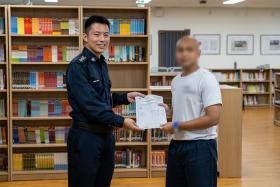Overcoming dyslexia through passion in sports, design
Mr Heng Yi Zen and Mr Patrick Siah overcame dyslexia through passion in sports, design respectively
When Mr Heng Yi Zen was diagnosed with dyslexia in Primary 1, it felt like a "black stain" that would follow him.
Now 23, Mr Heng is an undergraduate at the University of Warwick, majoring in management.
He is one of 3,600 students the Dyslexia Association of Singapore (DAS) has worked with in its 25 years of helping dyslexic people.
Mr Heng is featured in its 25th anniversary book, Clearly Different: Dyscovering The Differences, launched in July.
Dyslexia is a learning difficulty that can affect the ability to learn languages and verbal memory.
Like many dyslexic people, Mr Heng's self-esteem took a hit after he was diagnosed.
He was frustrated by his illegible handwriting and spelling errors. He also had to give up his mother tongue subject in Primary 6.Some dyslexic students are allowed to opt out of mother tongue, while others switch to foundation level.
"What made it worse was when my classmates wished they had dyslexia too, so they could get extra time during examinations," said Mr Heng, who was given 15 minutes of extra time for each subject during PSLE.
He started attending lessons at DAS in Primary 1, learning phonics, pronunciation, reading, writing and spelling, which helped him develop confidence.
"I remember sitting in the car and reading aloud to my dad before every DAS lesson. It was embarrassing initially, but as time went on, I saw improvements and made fewer mistakes," said Mr Heng.
He found his passion in sports, pursuing taekwondo, sailing and equestrianism in primary school.
"Playing sports was the only time I truly felt like I was on a completely equal footing with my peers."
Mr Heng now rows competitively for his university.
Mr Patrick Siah, 30, who owns interior design firm W5A, faced similar challenges in primary school.
He found his calling with design and technology (D&T) in secondary school and went on to obtain a master's degree in architecture at the University of Melbourne.
He said: "I wanted to be an architect after watching Phua Chu Kang, and when I did well for D&T, I was shocked because I had never received that kind of recognition before."
Ms Geetha Shantha Ram, director of the MOE-aided DAS literacy programme and staff professional development, encourages dyslexic students to embrace their difficulties.
"The challenges, while great, enable them to refine their skills, and their unique strengths and talents confirm that they have greatness within and success in life is definitely attainable."
About DAS
For the Dyslexia Association of Singapore (DAS), tackling perceptions of dyslexia is an ongoing battle.
"The challenge (now) is getting people to recognise that dyslexia impacts beyond reading and spelling," said its chief executive officer, Mr Lee Siang.
"It affects people across various age groups and their adult working life."
DAS projects it will provide $1.3 million in bursaries to students from lower-income families this year, more than double the $400,000 it disbursed five years ago.
Said Mr Lee: "We hope that the public will support our efforts in fund raising to ensure these students are not denied the help they need because of financial reasons." - ELAINE LEE
Get The New Paper on your phone with the free TNP app. Download from the Apple App Store or Google Play Store now



